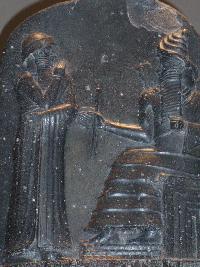| Pages in topic: < [1 2] | Looking for a book about interpreting in medieval times. Thread poster: Bartłomiej Stanirowski
|
|---|
Ty Kendall 
United Kingdom
Local time: 20:09
Hebrew to English
| Another idea...as Aisha hinted at | May 16, 2012 |
You might want to look beyond Europe, where the Middle Ages weren't so "dark".
Maybe interpreting was being discussed further afield.
| | | | | Equally depressing everywhere... if you were not rich | May 16, 2012 |
Ty Kendall wrote:
You might want to look beyond Europe, where the Middle Ages weren't so "dark".
Maybe interpreting was being discussed further afield.
Well, if we think of the common people, life has been pretty miserable all over the world until the 20th century, and still is in so many places. The problem is that in the past anything in writing was documented by people who had the time and need to write things, i.e. wealthy people or people with a solid position in a highly hierarchical society, whereas common people simply did not count.
Probably the 21st century is quite the Sternstunde for common people all over the world. Still very far from ideal, but much better compared to previous centuries, thanks to electricity and machinery.
| | | | Kirsten Bodart 
United Kingdom
Local time: 21:09
Dutch to English
+ ...
| In view of translated literature | May 16, 2012 |
It is quite strange to say that there was probably no interpretation. It will be in those circles where it was necessary, i.e. diplomacy. How can a king or an ambassador negotiate something if he cannot speak the language? In Latin. And if he doesn't know any Latin properly? In the end there will be someone in the process who doesn't speak Latin and therefore there must have been someone who translated what was being said (i.e. the interpreter).
The idea that the normal populace kne... See more It is quite strange to say that there was probably no interpretation. It will be in those circles where it was necessary, i.e. diplomacy. How can a king or an ambassador negotiate something if he cannot speak the language? In Latin. And if he doesn't know any Latin properly? In the end there will be someone in the process who doesn't speak Latin and therefore there must have been someone who translated what was being said (i.e. the interpreter).
The idea that the normal populace knew Latin is too simple. Compare it to going to mass every week in Italian (or any language you don't know, I have done that one): you end up knowing some formulae like 'this was the word of God our Lord', 'now the mass is finished', the 'Our Father in heaven' etc., but outside of that you can't put a sentence together or you should be a linguistic genius. They would be able to scrape a prayer together in Latin which they knew and at beast understood what it said (not sure about that), but not more than that. At any rate, they couldn't read anyway, so there was little need for them to know Latin.
The early noblemen (collapse of the Roman Empire to around 1400) I would be surprised if they could read, unless they were very high aristocracy. There were no books to practice, there was no time to practice, they had to learn to fight and then go and fight. There was no efficient road network so sending letters was not an activity to entertain, beside which paper did not exist and you just don't grab a sheet of parchment like you do a sheet of paper. A few hundred calves or sheep could be the toll to pay for a book...
As Mr Robert Bartlett said in his documentary 'Inside the Medieval Mind' (very good, you have to watch it!) sending a letter across England could take about 3 weeks. That puts the use of reading and writing into perspective.
However, there were pockets of culture and poetry was very much en vogue. 'Translations' of mainly French poetry and sagas were written in Flemish and I expect in English too. Reason why the French courtly love concept spread like a medieval wildfire. The Flemish embellished the Arthurian legend with the quest in the wood and Merlin. Writers who 'translated' (I put it between speech marks because it's different from translating now) did read works in foreign languages, so there definitely were people who understood foreign languages, particularly French, and reproduced them in their own. They even referenced their sources. These were not monks either.
I expect in the early days, before the arrival of paper and the printing press, being able to read and write was the privilege of the most important of people, like the king himself, embassadors, monks, the rest made do with their memory and other things like wooden sticks to do their bookkeeping. ▲ Collapse
| | | | | Oral vs. written | May 16, 2012 |
Kirsten Bodart wrote:
I expect in the early days, before the arrival of paper and the printing press, being able to read and write was the privilege of the most important of people, like the king himself, embassadors, monks, the rest made do with their memory and other things like wooden sticks to do their bookkeeping.
This is a very important fact here, and I mean that today it is completely inconceivable to feel that something is safely and truthfully documented unless it is put on a piece of paper (or, even better, a Youtube video!).
At the very least, until Renaissance a lot of what we today consider firmly established truths (because we can read about them on paper or watch a History Channel documentary) were transmitted orally, and that does not diminish their value or accuracy. Maybe a form of 'interpretation' would be that of those who learned some legend, tradition, historical fact, or revelation in a foreign country and told it in another place in their own language.
| | |
|
|
|
Rolf Keller
Germany
Local time: 21:09
English to German
| Ordinary people in the Middle Ages | May 16, 2012 |
Phil Hand wrote:
Though, I'm not sure you're right that ordinary people wouldn't know any Latin
Most of them were uneducated illiterates.
I'd be willing to bet that most people could scrape a few sentences together, if only some prayers.
Some of them were able to recite the Lord's Prayer, but they were not able to understand the wordings. Actually, they were not able to say e. g. "I like green apples!" in Latin. They just learned the foreign sounds by heart. That's why Luther translated the bible - he wanted to put the ordinary people in the way of understanding the text.
In certain enviromnments a similar situation exists even today, but it is politically incorrect to mention it.
| | | | | Travel writing | May 16, 2012 |
There are some interesting suggestions in this thread and Gennady has provided some interesting anecdotes. While I can't suggest any others off the top of my head, you could try some travel writers of the time - Ibn Batuta, the famous traveller who travelled across large parts of his native Africa and Asia, has quite a few interesting stories about the languages people spoke and how they communicated with each other. There is also Marco Polo, depending on how you view the veracity of his tales, ... See more There are some interesting suggestions in this thread and Gennady has provided some interesting anecdotes. While I can't suggest any others off the top of my head, you could try some travel writers of the time - Ibn Batuta, the famous traveller who travelled across large parts of his native Africa and Asia, has quite a few interesting stories about the languages people spoke and how they communicated with each other. There is also Marco Polo, depending on how you view the veracity of his tales, and others. There are a number of central Asian and Chinese travellers of that time but I can't name any without researching, sorry. Besides, there were far more nomadic peoples travelling around in those days too.
I'm not entirely convinced that the WHOLE world minus the 1% of the time was illiterate and digging in the ground, or that only men could read - the world's population would still be rather small if that was the case However, one of the bonuses of the widespread illiteracy and lack of internet/TV is that language was less standardised and in France and England for example, people undertaking pilgrimages to various religious centres would have come across many different languages and perhaps commented on this in their writing. There may even be something in the Canterbury Tales as a lead. However, one of the bonuses of the widespread illiteracy and lack of internet/TV is that language was less standardised and in France and England for example, people undertaking pilgrimages to various religious centres would have come across many different languages and perhaps commented on this in their writing. There may even be something in the Canterbury Tales as a lead.
There were professional interpreters too - they probably just didn't teach at Oxbridge or Bologna (or Baghdad ) and get their work published (apparently there was no one to read it ) and get their work published (apparently there was no one to read it ). ).
As for "theory", there is no reason you could not apply contemporary theory to such anecdotes and see how they correlate, if your purpose is academic.
I hope this is of some help, Aisha
p.s. Tomás, maybe it's not 0.0001% anymore, but there are plenty of people who believes it's still the 1% vs the 99% at the moment - you can ask the indignados! ▲ Collapse
| | | | | Off-the-record | May 16, 2012 |
Aisha Maniar wrote:
p.s. Tomás, maybe it's not 0.0001% anymore, but there are plenty of people who believes it's still the 1% vs the 99% at the moment - you can ask the indignados!
I am quite sure that, being self-employed and having no public help available if my professional activity fails or I get ill, my view on "indignados" would be completely out of topic, so please allow me to keep silent about it.
| | | | Kay Denney 
France
Local time: 21:09
French to English
| the importance of speech | May 16, 2012 |
Ty Kendall wrote:
Another thing you should remember is that until quite recently, the spoken word was never given the same reverence as the written word. It wouldn't have been an area worthy of study, investigation or scrutiny.
Well no, I think that it was quite the contrary. When the only people who could read and write were monks and scribes (not necessarily the lords and kings who sometimes could only sign their name, who indeed considered such skills beneath them), far more attention was paid to the spoken word.
Thus Galileo was made to utter a public statement to the effect that the sun revolved round the earth and that the earth didn't move (and then muttered "but it moves" under his breath in a desperate stab for integrity and truth, hoping that the clergy wouldn't hear him but that others would).
Of course this story has been handed down to us via written accounts, but the fact is that he had to say it publicly, with plenty of witnesses: that was more important than writing it.
This is also why witnesses are called to the bar to give their accounts orally: not enough people could read to have it all simply bundled into a report and submitted to a jury.
There is the added fact that when a person makes an oral statement it is easier to tell whether they are telling the truth, which explains why it is still common practice.
| | |
|
|
|
| Grassroot intercultural communication in the MA | May 17, 2012 |
The mission of Saint Francis of Assisi to the Sultan al-Kamil. St. Francis had many long talks with the Sultan. Which tongue they spoke, who assisted them? http://en.wikipedia.org/wiki/Al-Kamil
Many Sufis of that time were hostel keepers, especially in Northern and Western Persia and Central Asia.
The Hospitallers, too...
Don't forget that that was the age o... See more The mission of Saint Francis of Assisi to the Sultan al-Kamil. St. Francis had many long talks with the Sultan. Which tongue they spoke, who assisted them? http://en.wikipedia.org/wiki/Al-Kamil
Many Sufis of that time were hostel keepers, especially in Northern and Western Persia and Central Asia.
The Hospitallers, too...
Don't forget that that was the age of pilgrims.
Who knows, maybe intercultural/interl language communication at that time was much more intense and productive than now.
Off-topic (but, actually, not so far away): "it is widely acknowledged that the degradation of the natural environment, in particular, traditional habitats, entails a loss of cultural and linguistic diversity" Ref. http://www.unesco.org/new/en/culture/themes/endangered-languages/biodiversity-and-linguistic-diversity/
or turning it other way round, every village had its own language. It's very probable that the ancient people were all tough linguists, anytime they had to exchange milk or cheese for fire woods, imho.
==
The opinions of the scholars:
Roger Bacon: ‘Grammatica una et eadem est secundum substantiam in omnibus linguis, licet accidentaliter varietur’ (‘Grammar is one and the same in substance in all languages, even though it may vary in accidence’)
Thomas Aquinas: ‘In eadem lingua saepe diversa locutio fit, sicut patet in Francia, et Picardia, et Burgundia, et tamen una loquela est’ (‘In the same language there are often different ways of speaking, as is evident in France, in Picardy and in Burgundy, and nonetheless there is only one language’).
[Edited at 2012-05-17 10:33 GMT] ▲ Collapse
| | | | | Pages in topic: < [1 2] | To report site rules violations or get help, contact a site moderator: You can also contact site staff by submitting a support request » Looking for a book about interpreting in medieval times. | CafeTran Espresso | You've never met a CAT tool this clever!
Translate faster & easier, using a sophisticated CAT tool built by a translator / developer.
Accept jobs from clients who use Trados, MemoQ, Wordfast & major CAT tools.
Download and start using CafeTran Espresso -- for free
Buy now! » |
| | TM-Town | Manage your TMs and Terms ... and boost your translation business
Are you ready for something fresh in the industry? TM-Town is a unique new site for you -- the freelance translator -- to store, manage and share translation memories (TMs) and glossaries...and potentially meet new clients on the basis of your prior work.
More info » |
|
| | | | X Sign in to your ProZ.com account... | | | | | |










